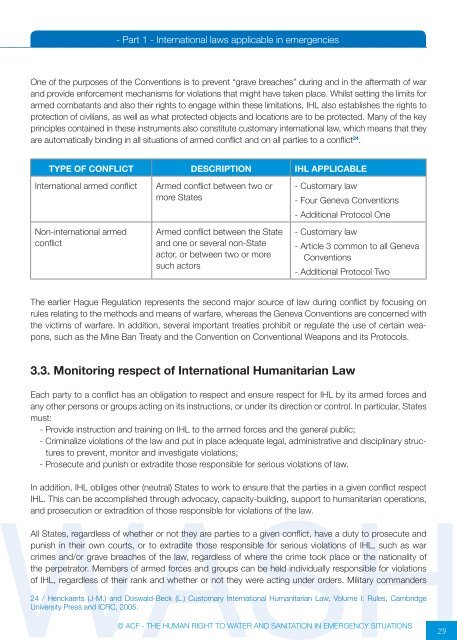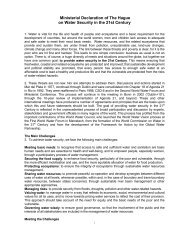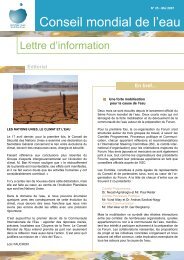the human right to water and sanitation in emergency situations
the human right to water and sanitation in emergency situations
the human right to water and sanitation in emergency situations
Create successful ePaper yourself
Turn your PDF publications into a flip-book with our unique Google optimized e-Paper software.
One of <strong>the</strong> purposes of <strong>the</strong> Conventions is <strong>to</strong> prevent “grave breaches” dur<strong>in</strong>g <strong>and</strong> <strong>in</strong> <strong>the</strong> aftermath of war<br />
<strong>and</strong> provide enforcement mechanisms for violations that might have taken place. Whilst sett<strong>in</strong>g <strong>the</strong> limits for<br />
armed combatants <strong>and</strong> also <strong>the</strong>ir <strong>right</strong>s <strong>to</strong> engage with<strong>in</strong> <strong>the</strong>se limitations, IHL also establishes <strong>the</strong> <strong>right</strong>s <strong>to</strong><br />
protection of civilians, as well as what protected objects <strong>and</strong> locations are <strong>to</strong> be protected. Many of <strong>the</strong> key<br />
pr<strong>in</strong>ciples conta<strong>in</strong>ed <strong>in</strong> <strong>the</strong>se <strong>in</strong>struments also constitute cus<strong>to</strong>mary <strong>in</strong>ternational law, which means that <strong>the</strong>y<br />
are au<strong>to</strong>matically b<strong>in</strong>d<strong>in</strong>g <strong>in</strong> all <strong>situations</strong> of armed conflict <strong>and</strong> on all parties <strong>to</strong> a conflict 24 .<br />
TYPE oF ConFLICT DESCRIPTIon IHL APPLICABLE<br />
International armed conflict Armed conflict between two or<br />
more States<br />
Non-<strong>in</strong>ternational armed<br />
conflict<br />
- Part 1 - International laws applicable <strong>in</strong> emergencies<br />
Armed conflict between <strong>the</strong> State<br />
<strong>and</strong> one or several non-State<br />
ac<strong>to</strong>r, or between two or more<br />
such ac<strong>to</strong>rs<br />
- Cus<strong>to</strong>mary law<br />
- Four Geneva Conventions<br />
- Additional Pro<strong>to</strong>col One<br />
- Cus<strong>to</strong>mary law<br />
- Article 3 common <strong>to</strong> all Geneva<br />
Conventions<br />
- Additional Pro<strong>to</strong>col Two<br />
The earlier Hague Regulation represents <strong>the</strong> second major source of law dur<strong>in</strong>g conflict by focus<strong>in</strong>g on<br />
rules relat<strong>in</strong>g <strong>to</strong> <strong>the</strong> methods <strong>and</strong> means of warfare, whereas <strong>the</strong> Geneva Conventions are concerned with<br />
<strong>the</strong> victims of warfare. In addition, several important treaties prohibit or regulate <strong>the</strong> use of certa<strong>in</strong> weapons,<br />
such as <strong>the</strong> M<strong>in</strong>e Ban Treaty <strong>and</strong> <strong>the</strong> Convention on Conventional Weapons <strong>and</strong> its Pro<strong>to</strong>cols.<br />
3.3. Moni<strong>to</strong>r<strong>in</strong>g respect of International Humanitarian Law<br />
Each party <strong>to</strong> a conflict has an obligation <strong>to</strong> respect <strong>and</strong> ensure respect for IHL by its armed forces <strong>and</strong><br />
any o<strong>the</strong>r persons or groups act<strong>in</strong>g on its <strong>in</strong>structions, or under its direction or control. In particular, States<br />
must:<br />
- Provide <strong>in</strong>struction <strong>and</strong> tra<strong>in</strong><strong>in</strong>g on IHL <strong>to</strong> <strong>the</strong> armed forces <strong>and</strong> <strong>the</strong> general public;<br />
- Crim<strong>in</strong>alize violations of <strong>the</strong> law <strong>and</strong> put <strong>in</strong> place adequate legal, adm<strong>in</strong>istrative <strong>and</strong> discipl<strong>in</strong>ary structures<br />
<strong>to</strong> prevent, moni<strong>to</strong>r <strong>and</strong> <strong>in</strong>vestigate violations;<br />
- Prosecute <strong>and</strong> punish or extradite those responsible for serious violations of law.<br />
In addition, IHL obliges o<strong>the</strong>r (neutral) States <strong>to</strong> work <strong>to</strong> ensure that <strong>the</strong> parties <strong>in</strong> a given conflict respect<br />
IHL. This can be accomplished through advocacy, capacity-build<strong>in</strong>g, support <strong>to</strong> <strong>human</strong>itarian operations,<br />
<strong>and</strong> prosecution or extradition of those responsible for violations of <strong>the</strong> law.<br />
All States, regardless of whe<strong>the</strong>r or not <strong>the</strong>y are parties <strong>to</strong> a given conflict, have a duty <strong>to</strong> prosecute <strong>and</strong><br />
punish <strong>in</strong> <strong>the</strong>ir own courts, or <strong>to</strong> extradite those responsible for serious violations of IHL, such as war<br />
crimes <strong>and</strong>/or grave breaches of <strong>the</strong> law, regardless of where <strong>the</strong> crime <strong>to</strong>ok place or <strong>the</strong> nationality of<br />
<strong>the</strong> perpetra<strong>to</strong>r. Members of armed forces <strong>and</strong> groups can be held <strong>in</strong>dividually responsible for violations<br />
of IHL, regardless of <strong>the</strong>ir rank <strong>and</strong> whe<strong>the</strong>r or not <strong>the</strong>y were act<strong>in</strong>g under orders. Military comm<strong>and</strong>ers<br />
24 / Henckaerts (J-M.) <strong>and</strong> Doswald-Beck (L.) Cus<strong>to</strong>mary International Humanitarian Law, Volume I: Rules, Cambridge<br />
University Press <strong>and</strong> ICRC, 2005.<br />
© ACF - THE HUMAN RIGHT TO WATER AND SANITATION IN EMERGENCY SITUATIONS<br />
29

















